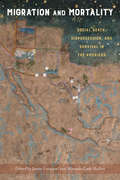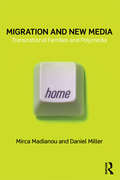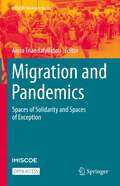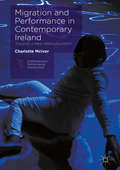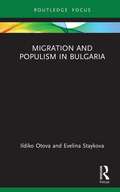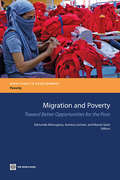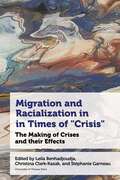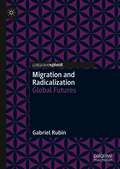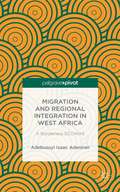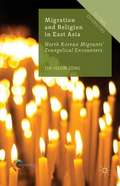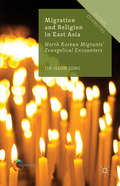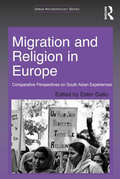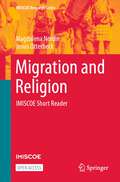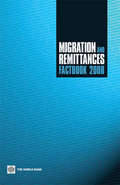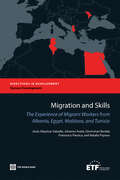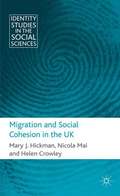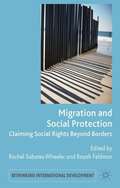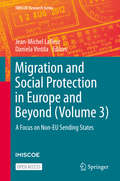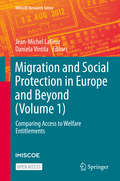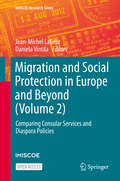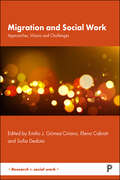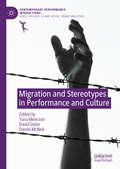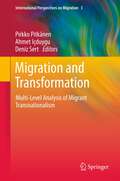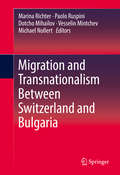- Table View
- List View
Migration and Mortality: Social Death, Dispossession, and Survival in the Americas
by Jamie Longazel and Miranda Cady HallettDeath threatens migrants physically during perilous border crossings between Central and North America, but many also experience legal, social, and economic mortality. Rooted in histories of colonialism and conquest, exclusionary policies and practices deliberately take aim at racialized, dispossessed people in transit. Once in the new land, migrants endure a web of systems across every facet of their world—work, home, healthcare, culture, justice—that strips them of their personhood, denies them resources, and creates additional obstacles that deprive them of their ability to live fully. As laws and policies create ripe conditions for the further extraction of money, resources, and labor power from the dispossessed, the contributors to this vibrant anthology, Migration and Mortality, examine restrictive immigration policies and the broader capitalist systems of exploitation and inequality while highlighting the power of migrants’ collective resistance and resilience. The case studies in this timely collection explore border deaths, detention economies, asylum seeking, as well as the public health and mental health of migrants. Ultimately, these examples of oppression and survival contribute to understanding broader movements for life and justice in the Americas.
Migration and National Identity in South Africa, 1860-2010
by Audie KlotzAn extraordinary outbreak of xenophobic violence in May 2008 shocked South Africa, but hostility toward newcomers has a long history. Democratization has channeled such discontent into a non-racial nationalism that specifically targets foreign Africans as a threat to prosperity. Finding suitable governmental and societal responses requires a better understanding of the complex legacies of segregation that underpin current immigration policies and practices. Unfortunately, conventional wisdoms of path dependency promote excessive fatalism and ignore how much South Africa is a typical settler state. A century ago, its policy makers shared innovative ideas with Australia and Canada, and these peers, which now openly wrestle with their own racist past, merit renewed attention. As unpalatable as the comparison might be to contemporary advocates of multiculturalism, rethinking restrictions in South Africa can also offer lessons for reconciling competing claims of indigeneity through multiple levels of representation and rights.
Migration and New Media: Transnational Families and Polymedia
by Daniel Miller Mirca MadianouHow do parents and children care for each other when they are separated because of migration? The way in which transnational families maintain long-distance relationships has been revolutionised by the emergence of new media such as email, instant messaging, social networking sites, webcam and texting. A migrant mother can now call and text her left-behind children several times a day, peruse social networking sites and leave the webcam for 12 hours achieving a sense of co-presence. Drawing on a long-term ethnographic study of prolonged separation between migrant mothers and their children who remain in the Philippines, this book develops groundbreaking theory for understanding both new media and the nature of mediated relationships. It brings together the perspectives of both the mothers and children and shows how the very nature of family relationships is changing. New media, understood as an emerging environment of polymedia, have become integral to the way family relationships are enacted and experienced. The theory of polymedia extends beyond the poignant case study and is developed as a major contribution for understanding the interconnections between digital media and interpersonal relationships.
Migration and Pandemics: Spaces of Solidarity and Spaces of Exception (IMISCOE Research Series)
by Anna TriandafyllidouThis open access book discusses the socio-political context of the COVID-19 crisis and questions the management of the pandemic emergency with special reference to how this affected the governance of migration and asylum. The book offers critical insights on the impact of the pandemic on migrant workers in different world regions including North America, Europe and Asia. The book addresses several categories of migrants including medical staff, farm labourers, construction workers, care and domestic workers and international students. It looks at border closures for non-citizens, disruption for temporary migrants as well as at special arrangements made for essential (migrant) workers such as doctors or nurses as well as farmworkers, ‘shipped’ to destination with special flights to make sure emergency wards are staffed, and harvests are picked up and the food processing chain continues to function. The book illustrates how the pandemic forces us to rethink notions like membership, citizenship, belonging, but also solidarity, human rights, community, essential services or ‘essential’ workers alongside an intersectional perspective including ethnicity, gender and race.
Migration and Performance in Contemporary Ireland
by Charlotte McivorThis book investigates Ireland's translation of interculturalism as social policy into aesthetic practice and situates the wider implications of this 'new interculturalism' for theatre and performance studies at large. Offering the first full-length, post-1990s study of the effect of large-scale immigration and interculturalism as social policy on Irish theatre and performance, McIvor argues that inward-migration changes most of what can be assumed about Irish theatre and performance and its relationship to national identity. By using case studies that include theatre, dance, photography, and activist actions, this book works through major debates over aesthetic interculturalism in theatre and performance studies post-1970s and analyses Irish social interculturalism in a contemporary European social and cultural policy context. Drawing together the work of professional and community practitioners who frequently identify as both artists and activists, Migration and Performance in Contemporary Ireland proposes a new paradigm for the study of Irish theatre and performance while contributing to the wider investigation of migration and performance.
Migration and Populism in Bulgaria
by Ildiko Otova Evelina StaykovaFocusing on Bulgaria, this book addresses the key issues of migration and populism, which have grown to become dominant topics of debate within Europe and across the world over the last decade. Ildiko Otova and Evelina Staykova trace the history of migration and populist discourses within Bulgaria from 1989 until the present day. The authors analyse how a lack of clear and coherent migration policies on migration over the years left Bulgaria unprepared for the 2015 European migrant crisis, thus leaving the door open for populist ideology to help shape public perceptions and narratives of migration as a menace and burden to society. Far from being confined to the extreme fringes of the political spectrum, Otova and Staykova reveal how populism has increasingly been co-opted by mainstream parties. This shift to the middle ground has led to what they claim to be a ‘normalisation’ in populist rhetoric, giving legitimacy to attitudes towards migration as a threat to society, which they argue, in turn, renders constructive policymaking far more difficult. Adopting an interdisciplinary approach, this book is an important tool for postgraduate students and researchers of Political Sciences, Migration Studies, European Studies and European History, as well as practitioners working in the field of international migration and asylum.
Migration and Poverty: Towards Better Migration Opportunities for the Poor
by Marcin Sasin Edmundo Murrugarra Jennica LarrisonThis volume uses recent research from the World Bank to document and analyze the bidirectional relationship between poverty and migration in developing countries. The case studies chapters compiled in this book (from Tanzania, Nepal, Albania and Nicaragua), as well as the last, policy-oriented chapter - illustrate the diversity of migration experience and tackle the complicated nexus between migration and poverty reduction. Two main messages emerge: Although evidence indicates that migration reduces poverty, it also shows that migration opportunities of the poor differ from that of the rest. In general, the evidence suggests that the poor either migrate less or migrate to low return destinations. As a consequence, many developing countries are not maximizing the poverty-reducing potential of migration. The main reason behind this outcome is difficulties in access to remunerative migration opportunities and the high costs associated with migrating. It is shown, for example, that reducing migration costs makes migration more pro-poor. The volume shows that developing countries' governments are not without means to improve this situation. Several of the country examples offer a few policy recommendations towards this end.
Migration and Racialization in Times of “Crisis”: The Making of Crises and their Effects (Studies in International Development and Globalization)
by Christina Clark-Kazak Stéphanie Garneau Leila Benhadjoudja Magalie Civil Yacout El Abboubi Gina VukojevićThe health crisis, the migration crisis, the humanitarian crisis, and the climate crisis. The repeating reference to the idea of crisis to label numerous social upheavals suggests that we now live in a world defined by crisis.Yet the urgency inherent in a crisis often leads to the normalization of rights violations and increased surveillance, profiling and arbitrary arrests, making visible the state’s control over bodies, and certain bodies, in particular.Migration and Racialization in Times of “Crisis” explores the colonial, racist and sexist underpinnings of various declarations of crisis, as well as their effects. Taken together, these contributions show that the state of crisis manifests as a condition for the maintenance of racial and patriarchal capitalism.The English and French version of this title, though distinct, complement each other to offer a more comprehensive and critical look at this approach of “governing through crisis”.
Migration and Radicalization: Global Futures
by Gabriel RubinThis book explores the connections between migration and terrorism and extrapolates, with the help of current research and case studies, what the future may hold for both issues. Migration and Radicalization: Global Futures looks at how migrants and terrorists have both been treated as Others outside the body politic, how growing migrant flows borne of a rickety state system cause both natives and migrants to turn violent, and how terrorist radicalization and tensions between natives and migrants can be reduced. As he contemplates potential global futures in the light of migration and radicalization, Gabriel Rubin charts a course between contemporary migration and terrorism scholarship, exploring their interactions in a methodologically rigorous but theoretically bold investigation.
Migration and Regional Integration in West Africa: A Borderless ECOWAS
by Adebusuyi Isaac AdeniranThis book explores the processes of migration and integration within the West African sub-region and unearths subsisting promises and failures of the ECOWAS' intent of transmuting the sub-region into a single socio-economic (and political) entity.
Migration and Religion in East Asia: North Korean Migrants' Evangelical Encounters (Global Diversities)
by Jin-Heon JungThis book sheds light on North Korean migrants' Christian encounters and conversions throughout the process of migration and settlement. Focusing on churches as primary contact zones, it highlights the ways in which the migrants and their evangelical counterparts both draw on and contest each others' envisioning of a reunified Christianized Korea.
Migration and Religion in East Asia: North Korean Migrants’ Evangelical Encounters (Global Diversities)
by Jin-Heon JungThis book sheds light on North Korean migrants' Christian encounters and conversions throughout the process of migration and settlement. Focusing on churches as primary contact zones, it highlights the ways in which the migrants and their evangelical counterparts both draw on and contest each others' envisioning of a reunified Christianized Korea.
Migration and Religion in Europe: Comparative Perspectives on South Asian Experiences (Urban Anthropology)
by Ester GalloReligious practices and their transformation are crucial elements of migrants' identities and are increasingly politicized by national governments in the light of perceived threats to national identity. As new immigrant flows shape religious pluralism in Europe, longstanding relations between the State and Church are challenged, together with majority-faith traditions and societies’ ways of representing and perceiving themselves. With attention to variations according to national setting, this volume explores the process of reformulating religious identities and practices amongst South Asian 'communities' in European contexts, Presenting a wide range of ethnographies, including studies of Hinduism, Sikhism, Jainism and Islam amongst migrant communities in contexts as diverse as Norway, Italy, the UK, France and Portugal, Migration and Religion in Europe sheds light on the meaning of religious practices to diasporic communities. It examines the manner in which such practices can be used by migrants and local societies to produce distance or proximity, as well as their political significance in various 'host' nations. Offering insights into the affirmation of national identities and cultures and the implications of this for governance and political discourse within Europe, this book will appeal to scholars with interests in anthropology, religion and society, migration, transnationalism and gender.
Migration and Religion: IMISCOE Short Reader (IMISCOE Research Series)
by Jonas Otterbeck Magdalena NordinThis open access book introduces research on migration and religion with the focus on migration to western European countries from the 1950s and onwards. The book is an in-depth presentation of the main research trends as to methods, theories and empirical zones on migration and religion. In a unique way, the book brings together research about the topic aligning it with the experiences and urgencies of migrants. The first part of three introduces key concepts and presents main research trends over time. The second part deals with the processes of establishment – on an individual level as well as on a group and society level. The third and final part focuses on religious change in relation to religious ideas and habits. It further highlights religious creativity. The third part finishes with a discussion about challenges to research and what we still do not know enough about.
Migration and Remittances Factbook 2008
by Dilip Ratha Zhimei Jamie Xu'The Migration and Remittances Factbook 2008' attempts to present the numbers and facts behind the stories of international migration and remittances, drawing on authoritative, publicly available data. It provides a snapshot of statistics on immigration, emigration, skilled emigration, and remittance flows for 194 countries, and 13 regional and income groups. Some interesting facts from the Factbook: - Nearly 200 million people, or 3 percent of the world population, live outside their countries of birth. Current migration flows, relative to population, are weaker than those of the last decades of the nineteenth century. - The volume of South-South migration is almost as large as that of South-North migration. - International migration is dominated by voluntary migration, which is driven by economic factors. In 2005, refugees numbered only 13.5 million, or just over 7 percent of international migrants. The share of refugees in the population of low-income countries was more than five times larger than the share in high-income OECD countries. - Worldwide remittance flows are estimated to have exceeded $318 billion in 2007, of which developing countries received $240 billion. The true size, including unrecorded flows through formal and informal channels, is believed to be significantly larger.
Migration and Skills
by Johanna Avato Natalia Popova Ummuhan Bardak Jesús Alquézar Sabadie Francesco PanzicaThe European Union (EU) is one of the most favored destinations for immigrants in the world. The subject of migration has been moving up the policy agenda of the EU for some time now. This increasing emphasis will continue with the EU 2020 (post-Lisbon) Strategy, which refers to the potential contribution of migration to EU growth and promotes the idea of labor mobility. Faced with an aging population, possible labor and skills shortages in the economies, and the need to compete for talent with countries such as Australia, Canada, and the United States, the EU is beginning to see legal migration as an opportunity and is thus taking a more proactive approach toward it. 'Migration and Skills: The Experience of Migrant Workers from Albania, Egypt, Moldova, and Tunisia' aims to unravel the complex relationship between migration and skills development. Based upon extensive field surveys carried out by the European Training Foundation and joint analysis of data with the World Bank, the book paints a precise picture of potential and returning migrants from four very different countries-two "traditional" (Egypt, Tunisia) and two "new" (Albania, Moldova) sending countries. It describes the skills these migrants possess, the extent to which migrants are able to use their skills and training while abroad, and the impact that the experience of migration has on their skills development. The book also offers suggestions on how the governments of countries sending migrants and countries receiving them could move towards more eff ective policies for managing legal migration flows. Policies that address the increasingly circular nature of migration benefit all parties involved. By studying the phenomenon of migration in detail, 'Migration and Skills: The Experience of Migrant Workers from Albania, Egypt, Moldova, and Tunisia' seeks to promote a better understanding of the human faces behind migration: who they are and what they can offer, both to their host countries and their origin countries to which they return.
Migration and Social Cohesion in the UK
by Nicola Mai Mary J. Hickman Helen CrowleyBased on a flagship research project for the Joseph Rowntree Foundation's Immigration and Inclusion programme, this book argues that social cohesion is achieved through people (new arrivals as well as the long-term settled) being able to resolve the conflicts and tensions within their day-to-day lives in ways that they find positive and viable.
Migration and Social Protection
by Rachel Sabates-Wheeler Rayah FeldmanThe growing scale of international migration has reshaped the debate on the social rights and social protection available to people outside their countries of origin. This book uses conceptual frameworks, policy analysis and empirical studies of migrants to explore international migrants' needs for and access to social protection across the world.
Migration and Social Protection in Europe and Beyond: A Focus on Non-EU Sending States (IMISCOE Research Series)
by Jean-Michel Lafleur Daniela VintilaThis third and last open access volume in the series takes the perspective of non-EU countries on immigrant social protection. By focusing on 12 of the largest sending countries to the EU, the book tackles the issue of the multiple areas of sending state intervention towards migrant populations. Two “mirroring” chapters are dedicated to each of the 12 non-EU states analysed (Argentina, China, Ecuador, India, Lebanon, Morocco, Russia, Senegal, Serbia, Switzerland, Tunisia, Turkey). One chapter focuses on access to social benefits across five core policy areas (health care, unemployment, old-age pensions, family benefits, guaranteed minimum resources) by discussing the social protection policies that non-EU countries offer to national residents, non-national residents, and non-resident nationals. The second chapter examines the role of key actors (consulates, diaspora institutions and home country ministries and agencies) through which non-EU sending countries respond to the needs of nationals abroad. The volume additionally includes two chapters focusing on the peculiar case of the United Kingdom after the Brexit referendum. Overall, this volume contributes to ongoing debates on migration and the welfare state in Europe by showing how non-EU sending states continue to play a role in third country nationals’ ability to deal with social risks. As such this book is a valuable read to researchers, policy makers, government employees and NGO’s.
Migration and Social Protection in Europe and Beyond: Comparing Access to Welfare Entitlements (IMISCOE Research Series)
by Jean-Michel Lafleur Daniela VintilaThis first open access book in a series of three volumes provides an in-depth analysis of social protection policies that EU Member States make accessible to resident nationals, non-resident nationals and non-national residents. In doing so, it discusses different scenarios in which the interplay between nationality and residence could lead to inequalities of access to welfare. Each chapter maps the eligibility conditions for accessing social benefits, by paying particular attention to the social entitlements that migrants can claim in host countries and/or export from home countries. The book also identifies and compares recent trends of access to welfare entitlements across five policy areas: health care, unemployment, family benefits, pensions, and guaranteed minimum resources. As such this book is a valuable read to researchers, policy makers, government employees and NGO’s.
Migration and Social Protection in Europe and Beyond: Comparing Consular Services and Diaspora Policies (IMISCOE Research Series)
by Jean-Michel Lafleur Daniela VintilaThis second open access book in a series of three volumes examines the repertoire of policies and programmes led by EU Member States to engage with their nationals residing abroad. Focusing on sending states’ engagement in the area of social protection, this book shows how a series of emigration-related policies that go beyond the realm of social security address the needs of nationals abroad in the area of health care, unemployment, family benefits, pensions and economic hardship. In addition, this volume highlights the variety of sending states’ institutions that are involved in these policies (consulates, diaspora institutions, ministries, agencies…) and their engagement with citizens abroad in other policy areas such as electoral rights, citizenship, language, culture, education, business or religion. As such this book is a valuable read to researchers, policy makers, government employees and NGO’s.
Migration and Social Work: Approaches, Visions and Challenges (Research in Social Work)
by Emilio José Gómez-Ciriano, Elena Cabiati and Sofia DedotsiWith cross-cultural perspectives from contributors in nine countries, this book showcases much-needed research on current issues around migration and social work in Europe. Focusing on the reception, experiences and integration of refugees and asylum seekers, the chapters also consider the impact of recent EU policies on borders and integration. With racism on the rise in some European societies, the book foregrounds international social work values as a common framework to face discriminatory practice at macro and micro levels. Featuring recommendations for inclusive practice that ‘opens doors’, this book features the voices of migrants and the practitioners aiding their inclusion in new societies.
Migration and Stereotypes in Performance and Culture (Contemporary Performance InterActions)
by David Dean Yana Meerzon Daniel McNeilThis book is an interdisciplinary collection of essays that delves beneath the media headlines about the “migration crisis”, Brexit, Trump and similar events and spectacles that have been linked to the intensification and proliferation of stereotypes about migrants since 2015. Topics include the representations of migration and stereotypes in citizenship ceremonies and culinary traditions, law and literature, and public history and performance. Bringing together academics in the arts, humanities and social sciences, as well as artists and theatre practitioners, the collection equips readers with new methodologies, keywords and collaborative research tools to support critical inquiry and public-facing research in fields such as Theatre and Performance Studies, Cultural and Migration Studies, and Applied Theatre and History.
Migration and Transformation:
by Pirkko Pitkänen Deniz Sert Ahmet IçduyguPeople's transnational ties and activities are acquiring ever greater importance and topicality in today's world. The focus of this book lies in the complex and multi-level processes of migrant transnationalism in four transnational spaces: India-UK, Morocco-France and Turkey-Germany and Estonia-Finland. The main question is, how people's activities across national borders emerge, function, and change, and how are they related to the processes of governance in increasingly complex and interconnected world? The book is based on the findings of a three-year research project TRANS-NET which brough together internationally acknowledged experts from Europe, Asia and Africa. As no single discipline could investigate all the components of the topic in question, the project adopted a multi-disciplinary approach: among the contributors, there are sociologists, policy analysts, political scientists, social and cultural anthropologists, educational scientists, and economists. The chapters show that people's transnational linkages and migration across national boundaries entail manifold political, economic, social, cultural and educational implications. Although political-social-economic-educational transformations fostered by migrant transnationalism constitute the main topic of the book, the starting assumption is that the large-scale institutional and actor-centred patterns of transformation come about through a constellation of parallel processes.
Migration and Transnationalism Between Switzerland and Bulgaria
by Marina Richter Paolo Ruspini Dotcho Mihailov Vesselin Mintchev Michael NollertThis book explores trends in migration from Bulgaria to Switzerland since Bulgaria joined the European Union (EU) in 2007. Due to several unique factors, this in-depth case provides a basis for understanding transnational migration in a wider European context. Bulgarians represent a fairly small community within Switzerland, and are quite scattered throughout the region. In Switzerland, apart from differences in linguistic regions and the federal system, there are significant regional disparities, providing several different contexts for exploring this transnational migration, causes and consequences. The first part of the book examines who migrates and why, exploring regional disparities within Bulgaria. The book investigates the impact of economic differences, educational background, and other factors that play into immigrants' motivations to move. The next part of the book examines different migratory movements and transnational practices between Switzerland, Bulgaria, and other destination countries for Bulgarian immigrants. It addresses larger shifts and impacts resulting from migration, with impacts at the household, community, and national levels. Finally, the book analyses all of these factors within the context of shifting immigration policies. This work draws on mixed-method empirical research conducted in both countries over a three-year period, analyzed within four major frameworks: transnationalism and migrant networks, social inequality, regional disparities and development, and immigration policies. The results will be of interest for researchers interested in a variety of social science fields, including sociology, social psychology, law, public policy, political science, international studies, demography and exploring issues related to social disparities, crime and deviance and economic inequality.
